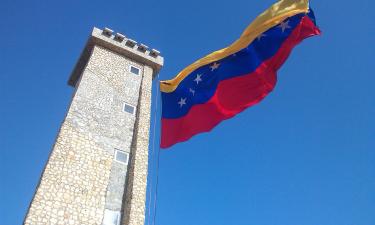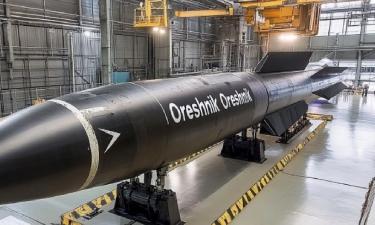Georgia's Saakashvili commits war crimes against humanity
A surprise military offensive by Georgia, a staunch U.S. ally, to retake the breakaway province of South Ossetia reportedly killed hundreds of people Friday, triggering a ferocious counterattack from Russia that threatened to plunge the region into full-scale war.
Moscow, which has close ties to South Ossetia, sent a column of tanks rolling into South Ossetia and reportedly attacked two Georgian air bases as it moved to assert itself as the dominant regional power.
As night fell, there were wildly conflicting claims as to who held the battlefield advantage.
Georgian President Mikhail Saakashvili said "Georgian military forces completely control all the territory of South Ossetia" except for a northern section adjacent to Russia. But Russian news agencies cited a Russian military official as saying heavy fighting was under way on the outskirts of the regional capital.
Witnesses said the South Ossetian capital, Tskhinvali, was devastated.
"We lost our city ... The Georgians are like Nazis, they are killing civilians, women and children with heavy artillery and rockets," said 28-year-old Sarmat Laliyev, a Tskhinvali resident who had fled to Dzhava, a village near the border with Russia.
The fighting broke out as much of the world's attention was focused on the start of the Olympic Games and many leaders, including Russia's Prime Minister Vladimir Putin and President Bush, were in Beijing.
The timing suggests Saakashvili may have been counting on surprise to fulfill his longtime pledge to wrest back control of South Ossetia _ a key to his hold on power.
Saakashvili agreed the timing was not coincidental, but accused Russia of being the aggressor. "Most decision makers have gone for the holidays," he said in an interview with CNN. "Brilliant moment to attack a small country."
Diplomats issued a flurry of statements calling on both sides to halt the fighting, but with no immediate effect. It was unclear what might persuade either side to stop shooting. Both claim the battle started after the other side violated a cease-fire that had been declared just hours earlier after a week of sporadic clashes.
The United States was sending its top Caucasus envoy, Deputy Assistant Secretary of State Matthew Bryza, to the region to try to end the bloodshed.
Russia, which has granted citizenship to most of the region's residents, appeared to lay much of the responsibility for ending the fighting on Washington.
In a telephone conversation with U.S. Secretary of State Condoleezza Rice, Russian Foreign Minister Sergey Lavrov said Georgia must be convinced to withdraw its forces, according to a ministry statement.
Georgia has about 2,000 troops in Iraq, making it the third-largest contributor to coalition forces after the U.S. and Britain. But Saakashvili told CNN that the troops would be called home Saturday in the face of the South Ossetia fighting.
Georgia, which borders the Black Sea between Turkey and Russia, was ruled by Moscow for most of the two centuries preceding the breakup of the Soviet Union. Georgia has angered Russia by seeking NATO membership _ a bid Moscow regards as part of a Western effort to weaken its influence in the region.
The leader of South Ossetia's rebel government, Eduard Kokoity, said about 1,400 people were killed in the onslaught, the Interfax news agency reported. The toll could not be independently confirmed.
Twelve Russian peacekeepers were killed and 30 wounded in the fighting, said Russian Ground Forces spokesman Col. Igor Konashenkov. Russia has soldiers in South Ossetia as peacekeeping forces but Georgia alleges they back the unrecognized republic.
Georgia's Foreign Ministry accused Russian aircraft of bombingtwo military air bases inside Georgia, inflicting some casualties and destroying several military aircraft. Rustavi 2 television said four people were killed and five wounded at the Marneuli air base.
Russia's Defense Ministry said it was sending reinforcements for its peacekeepers, and Russian state television and Georgian officials reported a convoy of tanks had crossed the border. The convoy was expected to reach the provincial capital, Tskhinvali, by evening, Channel One television said.
"We are facing Russian aggression," said Georgia's Security Council chief Kakha Lomaya. "They have sent in their troops and weapons and they are bombing our towns."
Putin warned in the early stages of the conflict that the Georgian attack would draw retaliation and the Defense Ministry pledged to protect South Ossetians, most of whom have Russian citizenship.
Chairing a session of his Security Council in the Kremlin, Russian President Dmitry Medvedev also vowed that Moscow will protect Russian citizens.
"In accordance with the constitution and federal law, I, as president of Russia, am obliged to protect lives and dignity of Russian citizens wherever they are located," Medvedev said. "We won't allow the death of our compatriots go unpunished."
On Friday, an AP reporter saw tanks and other heavy weapons concentrating on the Russian side of the border with South Ossetia _ supporting the reports of an incursion. Some villagers were fleeing into Russia.
"I saw them (the Georgians) shelling my village," said Maria, who gave only her first name. She said she and other villagers spent the night in a field and then fled toward the Russian border as the fighting escalated.
Yakobashvili said Georgian forces had shot down four Russian combat planes over Georgian territory but gave no details. Russia's Defense Ministry denied an earlier Georgia report about one Russian plane downed and had no immediate comment on the latest claim.
Yakobashvili said that one Russian plane had dropped a bomb on the Vaziani military base near the Georgian capital, but no one was hurt.
More than 1,000 U.S. Marines and soldiers were at the base last month to teach combat skills to Georgian troops. Georgia has about 2,000 troops in Iraq, making it the third-largest contributor to coalition forces after the U.S. and Britain.
South Ossetia officials said Georgia attacked with aircraft, armor and heavy artillery. Georgian troops fired missiles at Tskhinvali, an official said, and many buildings were on fire.
Georgia's president said Russian aircraft bombed several Georgian villages and other civilian facilities.
A senior Russian diplomat in charge of the South Ossetian conflict, Yuri Popov, dismissed the Georgian claims of Russian bombings as misinformation, the RIA-Novosti news agency reported.
Saakashvili long has pledged to restore Tbilisi's rule over South Ossetia and another breakaway province, Abkhazia. Both regions have run their own affairs without international recognition since splitting from Georgia in the early 1990s and built up ties with Moscow.
Relations between Georgia and Russia worsened notably this year as Georgia pushed to join NATO and Russia dispatched additional peacekeeper forces to Abkhazia.
The Georgian attack came just hours after Saakashvili announced a unilateral cease-fire in a television broadcast late Thursday in which he also urged South Ossetian leaders to enter talks on resolving the conflict.
Georgian officials later blamed South Ossetia for thwarting the cease-fire by shelling Georgian villages in the area.
Subscribe to Pravda.Ru Telegram channel, Facebook, RSS!



